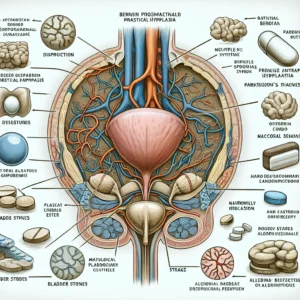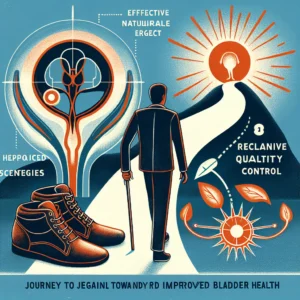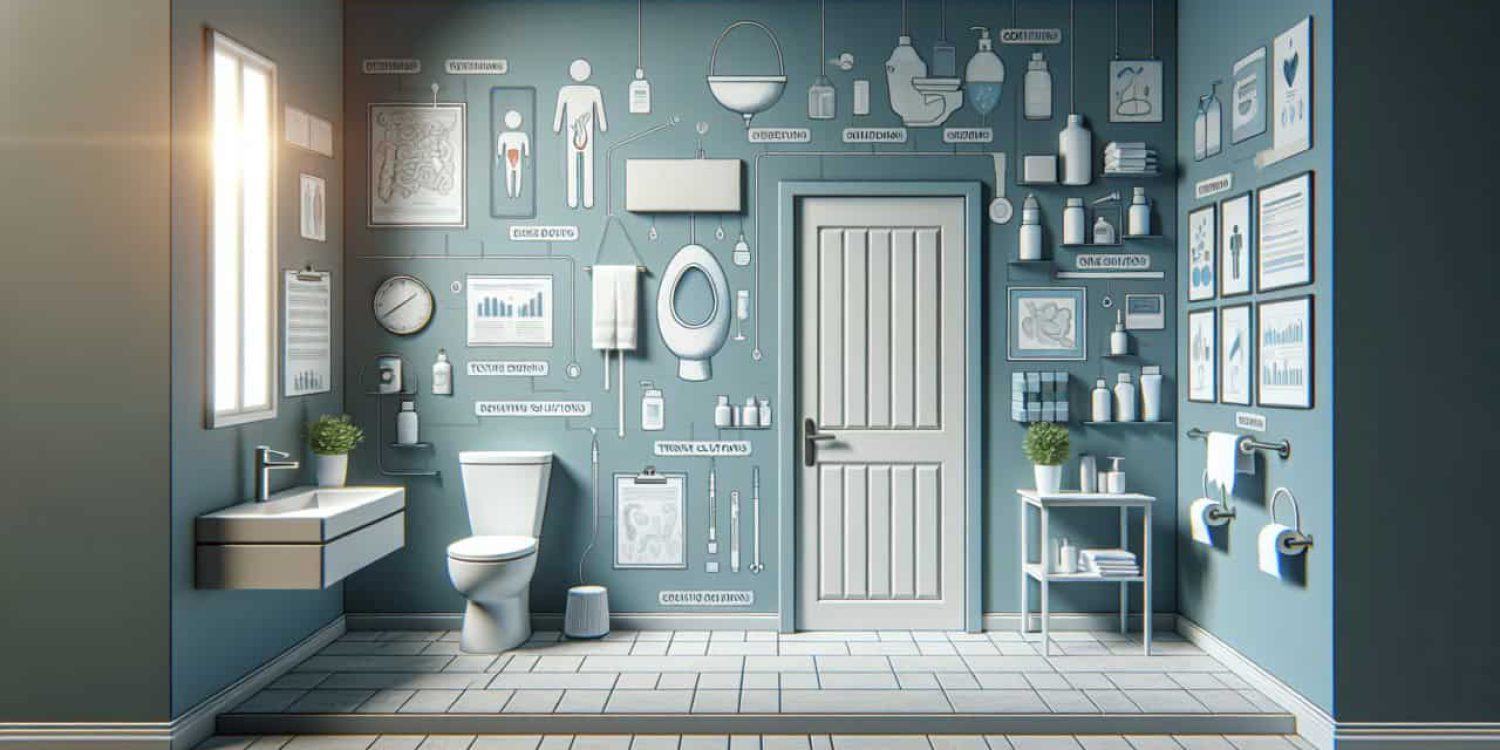Overcoming the Challenge of Frequent Urination: Understanding Your Options
Experiencing Overactive Bladder Syndrome (OAB) can be more than just a minor inconvenience; it can significantly disrupt your daily life, impact your sleep quality, undermine your self-esteem, and strain your relationships. If you often find yourself dashing to the restroom during the day, waking up several times at night, or facing unexpected, urgent urination urges, rest assured that you are not alone in this struggle. Many men silently endure these symptoms, mistakenly believing that frequent urination is an unavoidable aspect of aging. You don't have to accept this condition as a normal part of your life—solutions exist that can help you regain control and improve your well-being.
Exploring the Intricacies of Overactive Bladder Syndrome
Overactive Bladder Syndrome (OAB) is a condition that affects millions globally, yet it remains a largely under-discussed health issue. OAB occurs when the nerves and muscles of the bladder fail to communicate effectively, resulting in frequent and intense urges to urinate. Unlike a urinary tract infection (UTI), which tends to be a temporary condition treatable with antibiotics, OAB is chronic and necessitates a combination of management strategies and lifestyle modifications. This condition can arise from various factors, including an enlarged prostate, underlying neurological disorders, or even dietary choices that irritate the bladder, emphasizing the need for a comprehensive understanding of its causes and implications.
Recognizing the Symptoms of Overactive Bladder Syndrome
A well-functioning bladder can hold urine for several hours; however, OAB disrupts this ability, leading to various distressing symptoms. You may find yourself visiting the restroom more than eight times daily, experiencing frequent nighttime awakenings due to the need to urinate (nocturia), or feeling an overwhelming, sudden urge to relieve yourself. In some cases, individuals may suffer from urge incontinence, resulting in involuntary leakage before reaching the toilet. These symptoms may seem like minor inconveniences, but over time, they can severely impact your productivity at work, social interactions, and overall mental health.
 Unpacking the Causes of Overactive Bladder Syndrome
Unpacking the Causes of Overactive Bladder Syndrome
The bladder is an active organ that relies on a complex system of muscle contractions and nerve signals to function correctly. Disruptions in this system can lead to the development of OAB. For men, a common cause is benign prostatic hyperplasia (BPH), which can exert pressure on the bladder and hinder complete emptying. Additionally, neurological conditions such as Parkinson’s disease, multiple sclerosis, and stroke can interfere with normal bladder control. Factors like bladder stones, certain medications, and excessive consumption of alcohol and caffeine can also exacerbate symptoms, highlighting the multifaceted nature of this condition.
Understanding the Daily Life Impact of Overactive Bladder Syndrome
If your daily routine revolves around the proximity of restrooms, you are acutely aware of how disruptive OAB can be to your life. Beyond the physical discomfort, this condition can have far-reaching implications. Sleep quality deteriorates due to frequent bathroom trips at night, and work performance can decline when you frequently step away from important meetings or tasks. Moreover, intimacy and sexual health may suffer due to embarrassment or anxiety surrounding potential leakage. Over time, these challenges may lead to feelings of anxiety, depression, and social isolation. The encouraging aspect is that practical solutions exist, which do not necessarily require invasive procedures or reliance on medications that can cause unwanted side effects.
Strategies to Regain Control Over Your Bladder Health
Effectively managing OAB involves more than simply reducing your fluid intake or avoiding caffeine. A holistic and comprehensive approach that emphasizes bladder health, nerve function, and muscle control is essential for meaningful improvement. Fortunately, natural therapies, lifestyle modifications, and alternative treatments have shown promising results in alleviating symptoms without the potential risks associated with prescription medications.
Implementing a Holistic Strategy for OAB Management
Recent research increasingly supports the efficacy of herbal medicine, acupuncture, and specialized exercises in managing bladder dysfunction. Addressing the underlying causes rather than merely masking symptoms can provide long-lasting relief and empower you to take charge of your health.
 Exploring Herbal Remedies for Enhanced Bladder Function
Exploring Herbal Remedies for Enhanced Bladder Function
Nature offers a wealth of solutions for urinary health. Herbal extracts such as horsetail, nettles, and dandelion have been utilized for centuries to promote healthy bladder function. Horsetail acts as a natural diuretic, helping reduce fluid retention and strengthening bladder tissue. Nettles have anti-inflammatory properties and support prostate health, making them particularly beneficial for men dealing with OAB linked to BPH. Furthermore, dandelion root aids urinary tract health by flushing out toxins and supporting kidney function. When consumed in micro-encapsulated daily doses, these herbal remedies can provide consistent support without the adverse effects commonly associated with synthetic medications.
Harnessing Acupuncture to Improve Bladder Control
The principles of Traditional Chinese Medicine highlight the significance of energy flow in maintaining organ function. Acupuncture, which entails the insertion of fine needles into specific points on the body, has been shown to help regulate bladder activity. Research indicates that acupuncture can enhance bladder control by calming overactive nerves and fortifying the pelvic floor muscles. Over time, this leads to diminished urges, increased bladder capacity, and improved sleep quality.
Building a Stronger Pelvic Floor for Better Bladder Control
Weak pelvic muscles can contribute to the symptoms associated with OAB. Targeted pelvic floor exercises—often called Kegel exercises—can effectively strengthen these muscles, enhancing bladder control. Unlike high-impact workouts that may exacerbate urinary issues, these exercises are discreet, can be performed anywhere, and are highly effective. Consistent practice helps prevent leakage and reduces the sudden urgencies that characterize OAB.
Embracing Small Lifestyle Changes for Significant Improvements
If OAB is affecting your life, it’s crucial to reassess your daily habits. Reducing your intake of caffeine, alcohol, and artificial sweeteners can have a profound impact, as these substances are known to irritate the bladder lining. Staying hydrated is essential, but the timing of fluid intake matters—aim to hydrate earlier in the day and limit liquid consumption in the evening to decrease nighttime bathroom visits. Additionally, managing stress is vital since anxiety can trigger bladder spasms and worsen symptoms. Deep breathing exercises, meditation, and mindfulness practices can help soothe the nervous system and enhance bladder control.
 Take the First Steps Toward Bladder Health Today
Take the First Steps Toward Bladder Health Today
Living with OAB should not dictate your life. With the appropriate strategies, you can reclaim control over your bladder, boost your confidence, and enhance your quality of life. If you’re ready to delve into natural therapies, acupuncture, and personalized guidance tailored to your needs, now is the perfect time to take action. There is no need to endure discomfort in silence when effective solutions are available.
Your Questions Answered: Frequently Asked Questions
What are the primary causes of overactive bladder in men?
Overactive bladder in men is frequently associated with prostate enlargement, nerve dysfunction, bladder irritation, and lifestyle choices. Certain medications and underlying health conditions can also play a role in manifesting symptoms.
How can I differentiate between OAB and simple excessive water consumption?
The hallmark symptoms of OAB include frequent urination, sudden urgency, and nighttime awakenings, irrespective of your fluid intake. If reducing your water consumption does not alleviate these symptoms, it likely indicates underlying bladder dysfunction rather than overhydration.
Are herbal treatments effective in improving bladder control?
Indeed, herbal remedies such as horsetail, nettles, and dandelion have been traditionally utilized to bolster urinary health. When administered in appropriate dosages and forms, these remedies can help reduce urgency, fortify bladder tissue, and enhance control over urinary functions.
Can acupuncture truly alleviate symptoms of OAB?
Clinical studies have demonstrated that acupuncture can effectively regulate bladder activity, diminish urgency, and strengthen pelvic muscles. Many individuals report substantial improvements in their symptoms following consistent acupuncture sessions.
Is experiencing OAB a normal part of the aging process?
While changes in bladder function can occur with age, OAB is not an unavoidable consequence of aging. Symptoms can be effectively managed with appropriate lifestyle adjustments, natural treatments, and professional support.
What lifestyle modifications can help alleviate OAB symptoms?
Limiting your consumption of caffeine, alcohol, artificial sweeteners, and spicy foods can significantly reduce bladder irritation. Strengthening pelvic muscles, managing stress levels, and ensuring proper hydration (with careful timing of fluid intake) can also help regulate bladder activity.
When should I seek professional assistance for OAB?
If frequent urination disrupts your sleep, interferes with your daily activities, or induces feelings of embarrassment, it is essential to seek professional guidance. You do not have to suffer in silence—numerous effective solutions are available to help you manage your symptoms.


























13 Comments
Oh man, the struggle is real! I always thought my bladder was auditioning for a lead role in a dramatic play—perpetually on stage and requiring immediate attention. I mean, who knew that a tiny organ could have such a big impact on your social calendar? I sometimes joke with friends that I keep my exercise routine on point just to have an excuse for all those sprinting trips to the restroom!
I appreciate how this post sheds light on such a nuanced topic that often goes unaddressed in both personal conversations and mainstream discussions. Overactive Bladder Syndrome (OAB) can indeed feel isolating, especially for men, who may feel pressure to mask such challenges due to societal expectations around masculinity and aging. I’ve seen how these experiences can affect not only one’s peace of mind but also their overall quality of life.
Your exploration of Overactive Bladder Syndrome (OAB) shines a necessary light on a topic that many people may not feel comfortable discussing. I’ve seen firsthand how this condition can affect not only those experiencing it but also their families and loved ones. The societal stigma surrounding urinary issues often leaves individuals in silence, leading to feelings of isolation and frustration.
Navigating the complexities of Overactive Bladder Syndrome (OAB) can indeed feel overwhelming, yet it’s heartening to see conversations surrounding it becoming more prevalent. As someone who has personally dealt with the impacts of OAB, I can attest to the frustration that relentless urgency can create in everyday life. It’s not just about the physical discomfort, but also the emotional toll it takes when social situations are marred by fretful restroom scouting or the constant worry of needing to dash out unexpectedly.
I totally get what you’re saying about the emotional toll that OAB can take. It’s not just about the need to go; it’s the way it infiltrates almost every aspect of life, especially in social situations. I’ve found that the constant worry can be exhausting. It’s like this background noise that you can’t shake, no matter how much you want to be present with friends or at an event.
You’re right, the emotional side of OAB doesn’t get enough attention, and it can really shape how you experience daily life. It’s not just the urge to go; it’s the mental energy spent worrying about whether you’ll find a restroom in time or avoiding situations because you know it’ll be a hassle. The constant vigilance can feel draining.
“I’m glad to hear you’re finding these discussions valuable! If you’re looking for more support and resources to help manage the emotional and practical aspects of OAB, you might find this guide helpful.”
https://mcrtherapies.co.uk/yt
I really appreciate this blog post for shedding light on Overactive Bladder Syndrome (OAB) and its significant impact on daily life. It’s a subject that many seem to shy away from discussing, and yet it affects so many people quietly. Like many others, I’ve had friends who, despite being healthy and active, have dealt with the challenges of frequent urination without ever knowing there were concrete steps they could take to address it.
Your post really shines a light on an often overlooked issue that many people struggle with but feel too embarrassed to discuss. I truly resonate with the impact OAB can have on daily life—it’s more than just a trip to the bathroom; it can feel like a barrier to so many activities. I once found myself avoiding social events because I was worried about access to restrooms, and it’s frustrating to think that something so common can interfere with living fully.
I really appreciate how you’ve highlighted the often-overlooked plight of those living with Overactive Bladder Syndrome (OAB). It’s true that many men feel hesitant to talk about it, thinking it’s just part of getting older. I’ve been there myself—balancing frequent restroom trips with social engagements can be stressful. It’s interesting to note how education on this topic is crucial; many aren’t aware that there are effective treatments available, from lifestyle changes to medical interventions.
It’s really refreshing to see someone open up about their experiences with Overactive Bladder Syndrome (OAB). It’s so true that our society often brushes these issues under the rug, especially when it comes to men discussing health concerns. The stigma can be stifling, and it definitely complicates social situations when you’re trying to enjoy an outing but just can’t seem to escape the restroom.
I appreciate this post for shedding light on a topic that many may find uncomfortable to discuss but affects so many of us—Overactive Bladder Syndrome (OAB). It’s refreshing to see it being addressed openly, as this condition can be quite isolating. I resonate with your point about how frequent urination can seep into various aspects of our lives, from self-image to how we interact with friends and family.
It’s really refreshing to see a conversation about Overactive Bladder Syndrome (OAB) gaining traction. I completely agree that it’s often brushed aside, especially among men who might feel embarrassed discussing it. I used to think frequent trips to the bathroom were just a part of getting older, but that mindset was definitely unhelpful.
It’s interesting how common OAB is yet how little it’s talked about. I’ve had my own struggles with frequent urination over the years, and it’s so easy to fall into the trap of thinking it’s just part of aging or something you have to endure. It really does have a ripple effect, impacting everything from sleep to social outings.